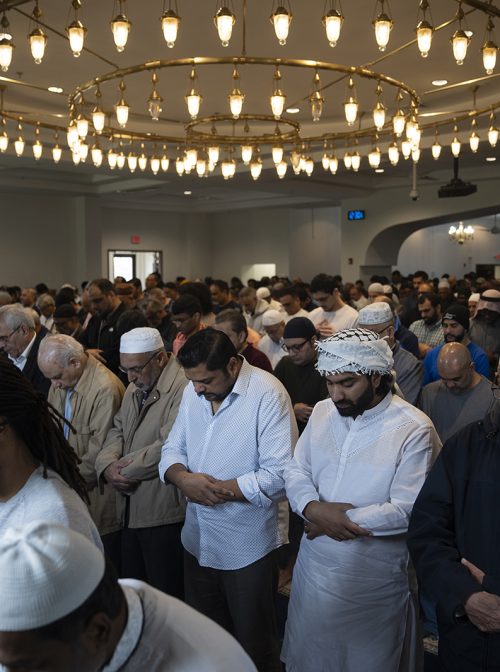(RNS) — This week, the world marks the convergence of two sacred times: the third week of Ramadan for Muslims and, for Christians, the final week of the Lenten season, or Holy Week. These sacred times, occurring amid global conflict, serve as a powerful reminder of our shared humanity, a sacred and holy disruption in an era of war, chaos and division.
For Muslims, the month of Ramadan marks a sacred period of fasting, reflection, spiritual expansion and community care. It transcends mere avoidance of sustenance from sunup to sundown; it is a practice that aims to cultivate profound empathy and serve as a reminder of the deeply intertwined nature of our lives, dreams and struggles. These sacred times call us to pause, reflect and reaffirm our commitment to peace, unity and the inherent dignity of all people.
For Christians, the season of Lent marks a 40-day journey between Ash Wednesday and Resurrection (aka, Easter Sunday). It is a time of reflection, repentance, sacrifice and spiritual renewal. The season is often accompanied by fasting to commemorate the 40-day fast of Jesus Christ, as recorded in the synoptic Gospel books Mark, Matthew and Luke in the Christian Bible. Admittedly, Christian fasts are often less strict and usually incorporate flexible fasts, including the Daniel fast, which is no meat; some only eat fish on Fridays, others fast from sunup to sundown, and most break fast on Sundays. Nevertheless, these practices are important spiritual modalities that ground people of faith across traditions.
In the tapestry of human traditions, fasting has been a thread woven through the fabric of many religions and spiritual practices, among them Islam and Christianity. This practice, which at its core is a sacred request of sacrifice, takes on a profound resonance when observed during periods of grief, oppression and global violence. It is during these times that the lessons inherent in fasting become invaluable insights.
The Rev. Janae Pitts-Murdock pointed out in a recent sermon: “The U.S. creates special months to recognize people it does not respect or protect.”
She pointed to Black History Month and Women’s History Month. This year, the Christian season of Lent began during Black History Month and continued into Ramadan and Women’s History Month, creating a sacred intersection that lasts 21 days. Black people, and especially Black women, know well the experience of being disrespected and what it means to be unprotected. In a world plagued with othering, war and genocide, Muslims, especially Muslim women, are at even greater risk. If ever a holy disruption was needed, it is now. Unlike national observances, these holy days are less focused on exterior expressions and more aptly focused on introspection.
For people who live in the daily dichotomy of being observed but not seen, these faith practices and holy observances ground them. In a world that moves at a chaotic pace, Ramadan and Lent can provide a reprieve. It is a collective reminder of something more powerful than our current conditions. This sacred season is an opportunity to engage in a physical kenosis that allows practitioners of faith to make room for the holy or prophetic imagination required to bring forth alternative visions.
In a time rife with turmoil, where communities are divided, conflicts rage and genocide has become a part of our daily vocabulary, fasting has become a unifying force. It is a shared experience that transcends geographical and cultural borders, creating a deep sense of solidarity. This voluntary sacrifice can help us recognize a fundamental truth — we are all human beings in search of safety, space to thrive and to belong in a world structured through racial, gender and economic hierarchies.
As we witness the sacred observance of fasting in both Islam and Christianity, we are reminded that there is wisdom in restraint and power in collective acts of devotion and protest. What we learn from these periods of going without is that sacrifice can lead to a greater understanding of ourselves and our place in the world. It can open our eyes to the struggles of others and inspire us to act with greater compassion and altruism.
In the end, perhaps the most valuable lesson we can draw from fasting during times of turmoil is the recognition of our shared vulnerability and the boundless potential for human connection and solidarity. As we reflect on the sacred request of sacrifice, we are called not only to go without but to go within — to find within ourselves the capacity for empathy, understanding, action and peace, qualities these times so desperately need.
May this sacred intersection lead to ongoing solidarity in a world committed to division.
(Rashida James-Saadiya is director of the Muslim Power Building Project and a Senior Civic Media Fellow at the USC Annenberg Innovation Lab. The Rev. Cassandra Gould is the senior strategist at Faith in Action National Network and an ordained itinerant elder serving at Metropolitan African Methodist Episcopal Church in Washington, D.C. The views expressed in this commentary do not necessarily reflect those of Religion News Service.)




